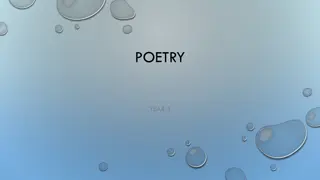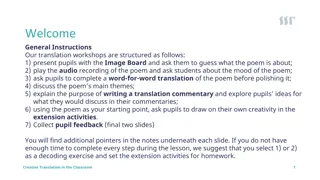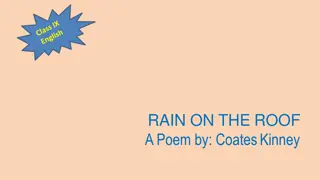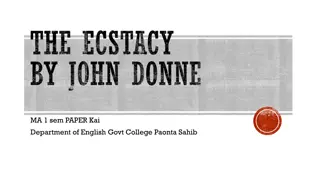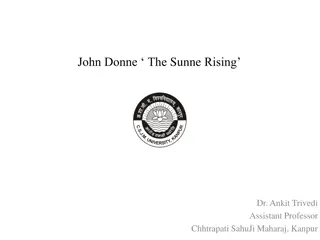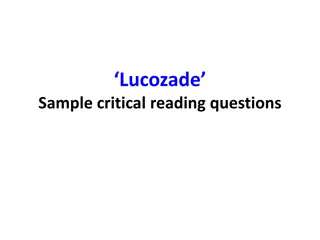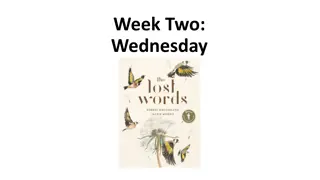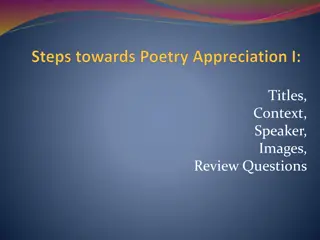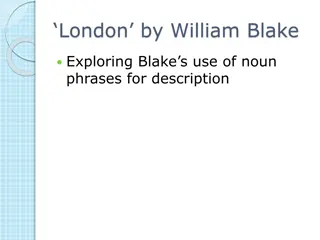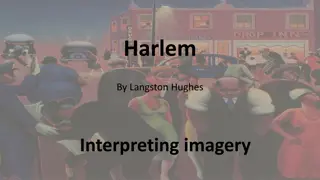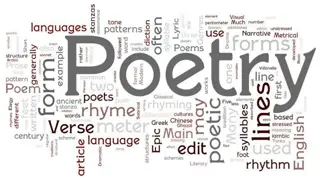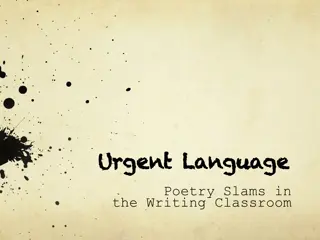Analysis of John Donne's Poem "The Sunne Rising
John Donne, a prominent English poet, showcases his artistic versatility and tumultuous life experiences in his works. His poems range from cynical satires to passionate love and religious expressions. "The Sunne Rising" reflects Donne's unconventional approach to love, where he challenges traditional ideals and explores human emotions in a vivid and captivating manner. The poem delves into themes of love, power dynamics, and the expansive nature of relationships, creating a nuanced portrayal of the complexities of human connection.
Download Presentation

Please find below an Image/Link to download the presentation.
The content on the website is provided AS IS for your information and personal use only. It may not be sold, licensed, or shared on other websites without obtaining consent from the author.If you encounter any issues during the download, it is possible that the publisher has removed the file from their server.
You are allowed to download the files provided on this website for personal or commercial use, subject to the condition that they are used lawfully. All files are the property of their respective owners.
The content on the website is provided AS IS for your information and personal use only. It may not be sold, licensed, or shared on other websites without obtaining consent from the author.
E N D
Presentation Transcript
THE SUNNE RISING JOHN DONNE
JOHN DONNE one of the most original of English poets. His poetic output is marked by a variety which reflects a rather tumultuous life. Married with his employer's niece Ann More which damaged his worldly prospects in 1601
His verse satires and early love poems like Go and catch a falling star or women's constancy are marked by a cynical witty contempt about women and their fickleness. Donne s religious poetry,including a series of 19 poems called Holy sonnets are a passionate expression of conflicting emotions. Songs and Sonnets,Donne s collection of love poetry has been called the most exhilarating body of love poetry in English . Donne s love poems are unconventional nothing in content and form. In Donne s love poems the realities of human sexual experience are never far away.
Thy beams, so reverend and strong Why shouldst thou think? I could eclipse and cloud them with a wink, But that I would not lose her sight so long; If her eyes have not blinded thine, Look, and tomorrow late, tell me, Whether both th' Indias of spice and mine Be where thou leftst them, or lie here with me. Ask for those kings whom thou saw'st yesterday, And thou shalt hear, All here in one bed lay.
She's all states, and all princes, I, Nothing else is. Princes do but play us; compared to this, All honor's mimic, all wealth alchemy. Thou, sun, art half as happy as we, In that the world's contracted thus. Thine age asks ease, and since thy duties be To warm the world, that's done in warming us. Shine here to us, and thou art everywhere; This bed thy center is, these walls, thy sphere. JOHN DONNE.
Has your alarm ever gone off and you laid there in bed with this elaborate fantasy that somehow just for you the sun wasn't really coming up? That you still had hours and hours of glorious sleepy-dreamy time? Come on, be honest. The reference to the king calling his huntsmen is a shout- out to the reigning King James I, who was known to love riding and hunting. Line 9, with all its commas and flip-flopped syntax is a little bit like a puzzle. At the most basic level, Donne is saying that love doesn't change with the seasons or climates.
We promised ourselves we would hold off as long as we could, but it's time for a lesson in medieval cosmology. Donne maybe stretches it a little in making a clever paradox in line 15. He tells the sun that if the beauty of his lover's eyes has not blinded the sun's eyes, then the sun should take a look around. Line 19 is parallel to line 16 the narrator commands the sun to check up on its kingdom. In line 16, he told the sun to tell him tomorrow what he saw; in line 19 he tells the sun to remember the kings he saw only yesterday. Basically, "Now you see them, now you don't."
We begin the last stanza talking about the lover, which is nice, because, you know, this is a love poem. Line 25 returns us to the apostrophe: Donne is talking to the sun. It also grows more brazen in its claim, saying the sun is "half as happy" as Donne. Usually the sun is seen as pretty, well, sunny. It's mighty bold to say that someone could be twice as happy. This last line is also another example of making metaphors by using a linking verb ("is") as a zeugma, just in case you wanted to hear us use that word again.
CRITICAL ANALYSIS OF THE POEM The Sun Rising is a love poem set in the speaker's bedroom, where he and his lover lay in bed presumably after a night of passion. The sun is seen as an unwanted dawn intruder, invading the Because of his interest in love, religion and morals and inventive use of form and intellectual prowess. Later on in life he devoted himself to religion, eventually becoming dean at St Pauls cathedral in London. His Holy Sonnets and other religious verse are a counterbalance to his more erotic writings. space, and is initially insulted before being challenged.
Because of his interest in love, religion and morals and inventive use of form and intellectual prowess, he is often known as father of the metaphysical poets. Later on in life he devoted himself to religion, eventually becoming dean at St Pauls cathedral in London. His Holy Sonnets and other religious verse are a counterbalance to his more erotic writings.
LITERATURE REVIEW OF THE POEM The Sun Rising (sometimes referred to with the original spelling, as The Sunne Rising ) is one of John Donne s most popular poems. In this poem, Donne apostrophises (i.e. addresses in a rhetorical fashion) the sun, as it peeps through the curtains in the morning, disturbing him and his lover as they lounge around in bed. The poem is worthy of close analysis because of the refreshing directness of language, the sheer arrogance of the poet s speaker, and the inventiveness of Donne s metaphors.
THEME AND MORAL OF THE POEM The main theme of this famous poem by Donne is about love. It is basically an aubade to his mistress upon waking in the morning, and it is a celebration of their love through the metaphysical conceit carried through in the form of the Sun. The Blossom and The Funeral. He advocates promiscuity in lighthearted poems such as The Indifferent and writes a witty seduction poem in The Flea.



